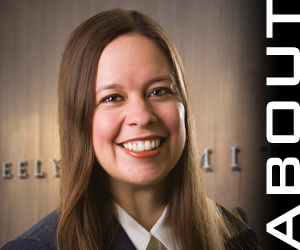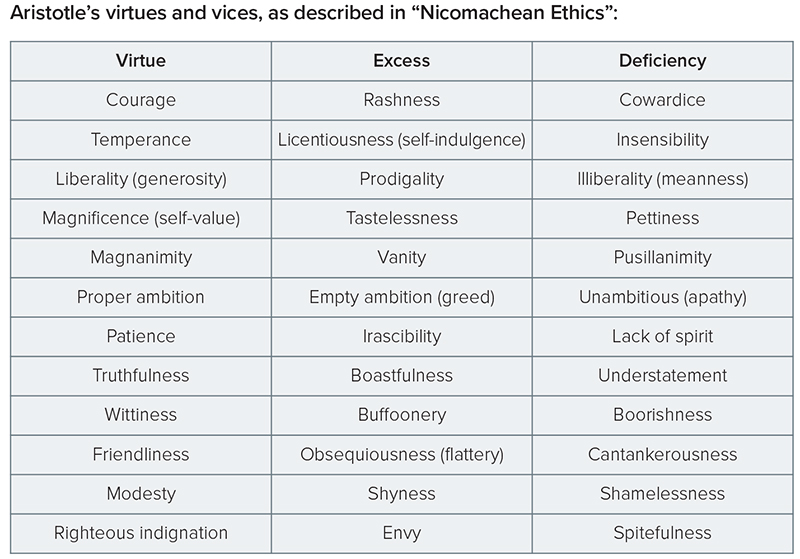Ethics Engaged | Spring 2020
Character: What CPAs Can Learn From Aristotle
Knowing who you are is how you become a better you, a better leader, and a better CPA.

Elizabeth Pittelkow Kittner
CFO and Managing Director, Leelyn Smith LLC
Exploring Ethics in Business & Finance Today
Character is important. The components of character have been studied for centuries and
are the focus of several philosophers’ and researchers’ work. Character drives your
consistent application of values in both familiar and foreign situations, and it is recognizing
your strengths and shortcomings. Character is defined as “the mental and moral qualities
distinctive to an individual,” which makes character a critical part of who you are and how
successful you can become.
One of the most referenced descriptions of character comes from Aristotle, who saw positive
character virtues existing on a spectrum between two extremes: deficiency and excess. In
other words, our strengths can become weaknesses when taken too far or when ignored.

Interestingly, research first published in 2014 by Amy Y. Ou and her colleagues from NUS
Business School, National University of Singapore, concluded that virtuous behaviors lead
to more success in business. They found humility and modesty in a CEO are virtues that
lead to stronger organizational performance, perhaps because virtuous behavior facilitates
positive relationships with the people around you.
Are you static on who you are, or are you consistently looking for ways to improve yourself?
Character drives how we act, how we are perceived and, ultimately, how successful we
and our organizations can become in the long term.
MAKING VIRTUE A HABIT
If you want to become a better you, a better leader, and a better CPA, you can work toward
making your virtues habitual as Aristotle recommended.
1. Do your best (even with the little things). For example, be on
time to meetings. People may not notice your timeliness, but they
will notice your untimeliness. Showing up on time is respectful of
others’ time and demonstrates self-discipline. How do you feel
about the person who constantly shows up to meetings late? You
may wonder what else that person is not doing well. And be
cautious of shortcuts. “It takes too much time to do the right thing,”
or, “No one is going to be hurt if I modify the results,” are common
justifications for speeding through tasks today. We live in a society
that values efficiency and quickness to results. However, these
types of justifications jeopardize our work and reputation and can
become a slippery slope to other vices.
2. Be purposeful. In finance and accounting, we have a basic
responsibility to accurately report numbers and to help nonfinancial
minds analyze the data for decision-making. Spend
your time on the items that matter most and make a difference
in what you are doing. For example, improve a process, teach a
colleague a new skill, or provide information you have to clients
or colleagues that will help to make their jobs or lives easier.
Remember to practice humility in your role and share the credit
for your successes.
3. Demonstrate courage. Practicing empathy and showing
courage can help you work through crucial conversations earlier
rather than later. In business, courage often looks like speaking
up when it is difficult. Courage is respectfully challenging ideas
and helping work toward the greater good and better decisions.
Courage is also letting others challenge your ideas, which
means you need to create an environment that welcomes open
communication. Maya Angelou said, “Courage is the most
important of all the virtues, because without courage you can’t
practice any other virtue consistently. You can practice any virtue
erratically, but nothing consistently without courage.”
4. Be accountable. Take responsibility for your work and own up
to mistakes instead of sharing or passing blame. These
behaviors will garner trust from your colleagues and clients. A
strong work ethic is also motivating and inspires others to do
more, too. Other ways to express accountability might include
doing more than the minimum in your commitments or meeting
deadlines early.
5. Choose kindness. When you are feeling a negative emotion like
frustration, anger, or annoyance, it can be tempting to take out
your feelings on the people causing the negative emotion or the
other people around you. This behavior perpetuates the
negativity. When we choose kindness and gratitude, we can
change the environment around us, and we can encourage
virtuous behaviors in others. In a work setting, publicly recognize
people for their good contributions, and explain to them and to
others why their work matters. In any setting, if a stranger is
unkind to you, be kind in return. Give them the generous
assumption that they may be experiencing a tough circumstance
you do not see.
WORDS OF WISDOM
Character-building starts in youth and evolves continuously. We are
works in progress. I encourage you to find people who inspire you
and pursue them as formal and informal mentors. Use them to
counterbalance your interactions with negative people, learn how
you are perceived, and cultivate your character.
Continuing to increase your self-awareness, values, and integrity, and
testing them through new experiences is how you learn who you
truly are, where you need to grow, and how virtuous you can be.